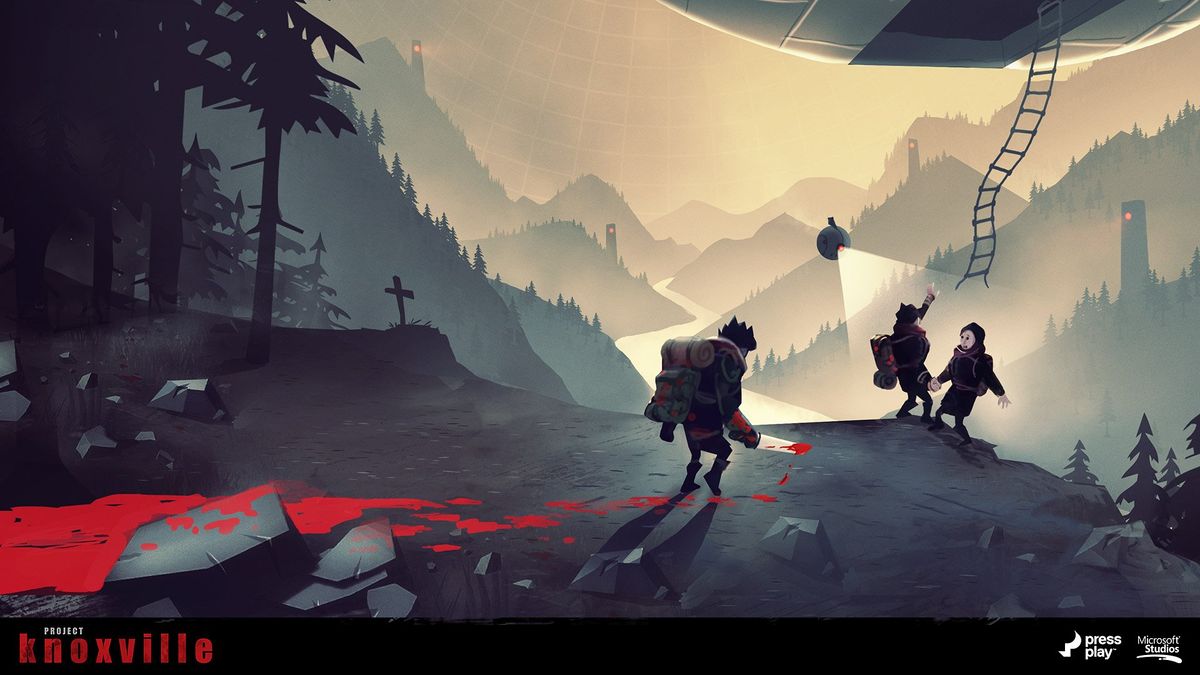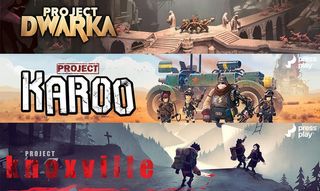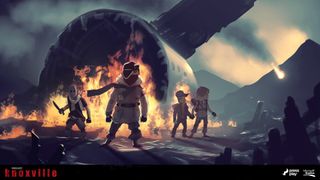Exclusive: Press Play discuss Project Knoxville, their ambitious and exclusive Xbox One survival game
Press Play are known for bringing unique first-party games to the Microsoft ecosystem, across mobile, PC and Xbox One.

Tentacles: Enter The Mind bewitched with its unique take on touch gameplay on Windows Phone, and Kalimba fried minds with its unique puzzle-platforming on Xbox One. The studio is perhaps best known for another puzzle-platformer, Max: The Curse of Brotherhood, which enraptured Xbox owners with its vibrant designs, charming characters and unique gameplay.
Press Play recently joined us to discuss Project Knoxville, an ambitious multiplayer survival game, where player interaction is key.
Project Knoxville is special because it got voted for by Xbox fans. Press Play produced concepts for three games in total and asked gamers to vote for their favourite. Project Dwarka was set to be Minecraft-meets-Diablo, pitting dwarves in procedurally generated dungeons crammed with loot. Project Karoo, on the other hand, was an open-world adventure game with an emphasis on modular, physics-based vehicle crafting.
Project Knoxville won the vote by a considerable margin, and in my opinion represents the most ambitious of the three titles. Project Knoxville is a collaborative third-person multiplayer game, modelled on the dystopian game shows from the likes of The Hunger Games or The Running Man. Players get thrown into an arena and are then tasked to survive objective-based challenges. Similarly to the popular Hunger Games movies, combatants can choose to work together, or against one another to further their odds of survival.
All players can survive, but the rewards for selfishness and betrayal may be too tempting.
We were joined by Press Play's community manager Søren Staal Balslev and project lead Mikkel Thorsted to discuss all things Project Knoxville!
JC: Firstly, allow me to say thank you for joining us for this QA session! Project Knoxville came about as the result of polling Xbox fans online, which is quite an unconventional way to decide on a new project. What made you guys opt for a popular vote?
SSB: Since we decided to establish a process of open development, it struck us: Why not make the decision democratic? Naturally, it's not how you develop games – but in terms of selection, it just seemed so obvious. We had so much love for each concept but were also rather excited to see if our fans would receive this notion well. Thankfully the reactions were really positive, and we are grateful for that.
Get the Windows Central Newsletter
All the latest news, reviews, and guides for Windows and Xbox diehards.
We had so much love for each concept but were also rather excited to see if our fans would receive this notion well.
MT: Creating games is on one hand extremely fun, creative and inspiring and, on the other hand, overly complex, expensive and frustrating. Games can be both of high quality and lots of fun - but might still not appeal to an audience. As creators, we love to share our passion, and we want our games to reach out as far as possible.
We believe one of the reasons for the frustrations is linked to the fact that game development is traditionally surrounded by a lot of secrecy. This ultimately means that we as developers spend years pouring all of our love into a game, without having any idea if players actually want to play our game. This makes stakeholders unwilling to take risks regarding new concepts and IPs, meaning creative and innovative new games become fewer and fewer. This is beneficial for neither us as developers, nor all the gamers looking for awesome new experiences.

We want to address this specific issue and strive to be innovative and creative, and we have several concepts we are working on, but we only want to make the ones that gamers share our passion for. Furthermore, for us, creating games is not about us being introvert and just wanting to please our own ego. It is about creating games that we can make gamers fall in love with, just as much as we do.
Gamers are much more than just consumers.
Gamers are much more than just consumers. They choose to invest a lot of their time in games and are in many ways the real experts when it comes to what makes the best experiences. This is something we would really love to benefit from. Why not open everything up and give them as many ways as possible to discuss, come up with ideas and to be part of the actual decision making?
Therefore, we want to bring gamers into our development as early as possible. We need their help to validate our concepts and shape our games throughout the development. We truly believe that we together with the community can create better games and make the development a lot more exciting.
JC: You guys had three concepts on offer, Project Dwarka, Project Karoo and Project Knoxville. Did Press Play staff get to join in with the vote? Did you guys have your favourites and preferences?
SSB: Sure, everyone had their own favorite! And truth be told, it was also hard to go through the entire voting process. You don't spend all that time and energy without getting emotionally invested. Then again, that also meant that we were very respective of each of the different projects - which in turn meant that if people actually voted, they didn't flash it around the office. All in all, it has been hard, so we are just glad to begin the actual work.

JC: My question relates to player behaviour as a game mechanic. Although it's not a perfect example, the MMO World of Warcraft has been around for so long that it feels like players have started to see each other as tools rather than players.
I've seen countless scenarios where the moment players start to lose a team-based PVP battleground, they collectively, instinctively, give up. They then try to lose as fast as possible to move on to the next match. Sometimes it feels like players eventually learn the path of least resistance.
If the community eventually falls into routines, always agreeing to work together, for example, will you do things to break that mentality and maintain the dynamism? How do you guys plan to approach that?
MT: It is a really interesting question - one that we often discuss. I personally think this game needs mechanics that makes us capable of constantly balancing the dynamics. Just the thought of the social experiment of how players behaviour changes over time is super fascinating. My goal for Knoxville is to create a game so dynamic that you can't predict the behavior of other players. I want us to make a game that will always be able to surprise everyone. To get there, I acknowledge that we need the right designs, mechanics and the possibility to always change things (i.e. game rules in the game).
My goal for Knoxville is to create a game so dynamic that you can't predict the behavior of other players.
JC: I voted for Project Dwarka, partly because I love dungeon crawlers, but also because I felt like it would have the biggest potential for mainstream appeal. The breakdown of the votes shows that Dwarka was in-fact the least popular (shows what I know!)
Why do you think people chose the less familiar Project Knoxville over the arguably more recognisable Dwarka and Karoo?
MT: This one is for me very personal and just my opinion. The easy thing for me to say here would be, well, the survival genre is very popular at the moment in both games, books and films. I honestly think it has something to do with the promise of creating dynamic relationships in an accessible multiplayer game, something that the world has not seen before. Truthfully though, all of the three concepts had unique and unfamiliar features.

JC: Is there any chance we could see Dwarka or Karoo return in the long-term future?
MT: Yes – but we can't promise anything!
JC: Are there any games out there which you're looking at to help gauge and influence the game's player-interactive systems? The idea of player trust and potential for betrayal reminds me of games like Day-Z.
MT: We are looking at everything really, but we have not been able to find any place this works in the way we would like it to. Really, what we are looking for is a system that creates consequences for people's actions.
JC: You guys cited The Hunger Games as an influence on the project. It's still early days, but will Project Knoxville have a plot of some sort? Persistent NPC characters perhaps, like a stereotypical game show announcer? The concept art of the "Dome" arena had me wondering about the world the game fits into.
MT: Yes, things are still the air but I strongly believe that we need a believable world with all that comes with it.

JC: Speaking of influences. Phil Spencer recently commented that the ratio of new IP is lower, inferring the risks involved with trying something fresh. I'm finding it hard to compare Knoxville to other games, which is probably a good thing for its uniqueness. Are you guys concerned about the risks of trying something new?
MT: Of course, we are concerned when we try to pull off something risky, new and ambitious. I would really be more concerned if we chose to go down a road with no risks or unanswered questions. Press Play has always been focused on bringing new things to games.
Press Play has always been focused on bringing new things to games.
JC: On the Knoxville website, it says that you're planning to include upgrade systems for multiple characters. Will the characters be fixed? Class-based? Or will the differences be cosmetic only?
MT: Good question. We don't know yet, but at the moment I am leaning towards customizable characters with certain skill trees, not classes. As with many of these questions, it is things we would love to discuss and design together with the community.
JC: We're seeing more and more titles plan cross-play between Xbox One and Windows 10, such as Gigantic, Fable Legends and Killer Instinct. Is this something Press Play is exploring for Project Knoxville?
MT: Too early to say at the moment, but it is differently intriguing.

JC: It says you guys are keen to set up interaction options for spectators as well as players. #IDARB tried something similar with its "hashbombs" mechanic, which allowed players to send in-game modifiers with a tweet. Are these sorts of things being explored for Knoxville?
MT: Yes, we are looking at every single imaginable way to make spectators interact with the game.
We are very much a Microsoft Studio and have strong ties to the other MS studios in both Europe and the States.
JC: Thinking of The Hunger Games and how the most skilled "tributes" become famous for their abilities, could Knoxville become eSport-like entertainment? Maybe the best Knoxville competitors could become internet celebs, for better or worse!
MT: Yes, we have - but we still think it is too early to say how it will actually work as an e-sport. For now supporting e-sport is not a goal, but it could be something that happens all by itself.
JC: Press Play is a Microsoft Studio, but to what extent are you guys able to follow your personal creative freedom? What's it like being part of MS Studios?
MT: We love being a part of Microsoft Studios. We are very much a Microsoft Studio and have strong ties to the other MS studios in both Europe and the States, but our creative ideas all come from Press Play.
JC: As you may know, WindowsCentral.com used to be WPCentral.com, and I think many of us here can fondly recall Tentacles: Enter The Mind. I have to ask... how did you guys come up with the concept for that game? A dolphin professor who invites an oily tentacle creature into his body? It's crazy, in a good way.
MT: It is a funny story too and sadly one that I'm not part of. My two fellow co-founders of Press Play actually came up with that universe and story on a plane ride back to Copenhagen from GDC in San Francisco. At that time, we were looking for investments and had less than a day to make a universe to fit our cool game mechanic. Ole and Rune most have been high on sleeping pills and thin air, but their idea was truly awesome.

Huge thanks to Mikkel Thorsted and Søren Staal Balslev from Press Play for joining us!
Project Knoxville is something we can look forward to in the years to come as part of the ever-expanding Xbox One exclusives pantheon. Be sure to check out Project Knoxville on MicrosoftStudios.com here, and if you want to help develop the game, you can apply to join their inner circle here.
Finally, let me ask, are you the sort of player who will co-operate and make friends? or are you more likely to betray everyone to further your own ends? Let us know what you think of Project Knoxville in the comments!

Jez Corden is the Executive Editor at Windows Central, focusing primarily on all things Xbox and gaming. Jez is known for breaking exclusive news and analysis as relates to the Microsoft ecosystem while being powered by tea. Follow on Twitter (X) and Threads, and listen to his XB2 Podcast, all about, you guessed it, Xbox!